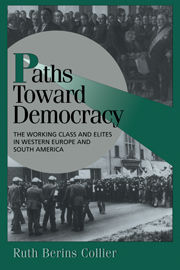Book contents
- Frontmatter
- Contents
- List of Figures and Tables
- Acknowledgments
- 1 Introduction: Elite Conquest or Working-Class Triumph?
- 2 Elite-Led Reform in Early Democratization
- 3 Political Calculations and Socialist Parties
- 4 Labor Action in Recent Democratization
- 5 Comparing the Patterns: The Working Class and Democratization
- Bibliography
- Index
4 - Labor Action in Recent Democratization
Published online by Cambridge University Press: 05 June 2012
- Frontmatter
- Contents
- List of Figures and Tables
- Acknowledgments
- 1 Introduction: Elite Conquest or Working-Class Triumph?
- 2 Elite-Led Reform in Early Democratization
- 3 Political Calculations and Socialist Parties
- 4 Labor Action in Recent Democratization
- 5 Comparing the Patterns: The Working Class and Democratization
- Bibliography
- Index
Summary
The processes of democratization at the end of the twentieth century are particularly complex in that they typically involve “ins” as well as “outs,” both the negotiation and protest arenas, and many different class actors among the “outs,” including, with the exception of two cases, labor groups. Within this commonality, different patterns can be distinguished according to the role of the working class and the incumbent project.
The country analyses in this chapter suggest that the comparative and theoretical literature has largely missed the importance of the working class and the labor movement in the democratization process in the 1970s and 1980s. The argument, of course, is not that these democratic transitions should be considered a working-class or labor project, that elite strategies were not also important, or that the labor movement and unionled protest were the most consequential sources of pro-democratic pressure. Furthermore, one must also recognize that other groups also engaged in protest, including, variously, human rights groups, nationalist groups, and urban social movements. These last typically organized and mobilized larger working-class groups in poor neighborhoods, rather than in the workplace, and often involved class-related grievances, demands, and identities. However, mobilization of the working class qua working class most clearly occurred through unions and union-affiliated parties, and this is the focus in the following analysis. In the overwhelming majority of cases, the roles of unions and labor-affiliated parties were important to a degree that is at most hinted at in the literature.
- Type
- Chapter
- Information
- Paths toward DemocracyThe Working Class and Elites in Western Europe and South America, pp. 110 - 165Publisher: Cambridge University PressPrint publication year: 1999
- 1
- Cited by



